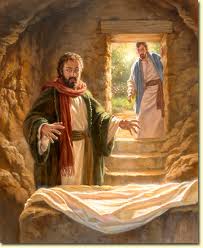Today we consider the mystery at the heart of the Christian faith. It is simple, but extraordinary and powerful. It was so mind-blowing that even the disciples and the apostles Jesus told it would happen didn’t believe it until they saw him. It shattered all their concepts of life. In the whole history of humanity death was the greatest fear, the curse to wish or inflict on your worst enemies. It was conquered. “Christ is Risen” says it all. We can no longer live the same way now that death has been defeated in Christ.
In today’s First Reading St. Peter reminds us that the Risen Christ only revealed himself to those who believed in him. Only those who believed in him were then blessed by meeting and eating and drinking with the Risen Lord. He reminds us that “everyone who believes in him will receive forgiveness of sins through his name”: on the day of our Baptism we had an encounter with the Risen Lord that transformed us into children pleasing to Our Heavenly Father, and he continues to reveal himself to those who believe in him. An encounter with the Risen Christ in faith is always a salvific and transforming experience.
In today’s Second Reading St. Paul reminds us that an outlook of faith keeps our eyes fixed on the things of above. When we gaze above in faith we know the Risen Christ stands at the right hand of His Father and intercedes for us. If we don’t see him it is because our faith is not strong enough and we need to beg for more. Pope Francis describes a certain class of Christians in Evangelii Gaudium who seem to live a permanent Lent: they have not had an experience of the Lord and his love, and, therefore, the Gospel brings them no joy. The Resurrection banishes vanity from our lives and changes our perspective.
In today’s Gospel we see that the Resurrection didn’t sink in for the disciples until they witnessed the results themselves. It leaves us in hopeful suspense because death no longer had the last word. The disciples had all the facts. Christ could raise the dead. Martha saw his brother Lazarus raised after three days in the tomb. The mourners of the dead little girl’s daughter mocked Jesus when he said she was sleeping, and then he “woke” her up. Even Mary thought today that the body had been stolen. The disciples walking to Emmaus had all the facts. After the Transfiguration he told Peter not to tell anyone until he was raised from the dead, and kept repeating that he would be raised from the dead on the third day. The disciples were clueless. We can’t blame them. Even today there are a lot of disciples of Christ who are clueless. All the facts are at hand, but they lack faith and so they live as if eternal life is a faery tale.
We have many more signs that they did: the Church has testified to the Resurrection for over two thousand years, and many of her children have gone to the grave believing that someday they would rise, just as Our Lord did. Like John in today’s Gospel let’s look at the signs of Jesus’ resurrection–an empty tomb, a suspiciously well-folded head wrapping–and simply believe.
Readings: Acts 10:34a, 37–43; Psalm 118:24; Psalm 118:1–2, 16–17, 22–23; Colossians 3:1–4; 1 Corinthians 5:7b–8a; John 20:1–9. See also Easter Sunday, Mass During the Day and Easter Sunday, Mass During the Day (2).


